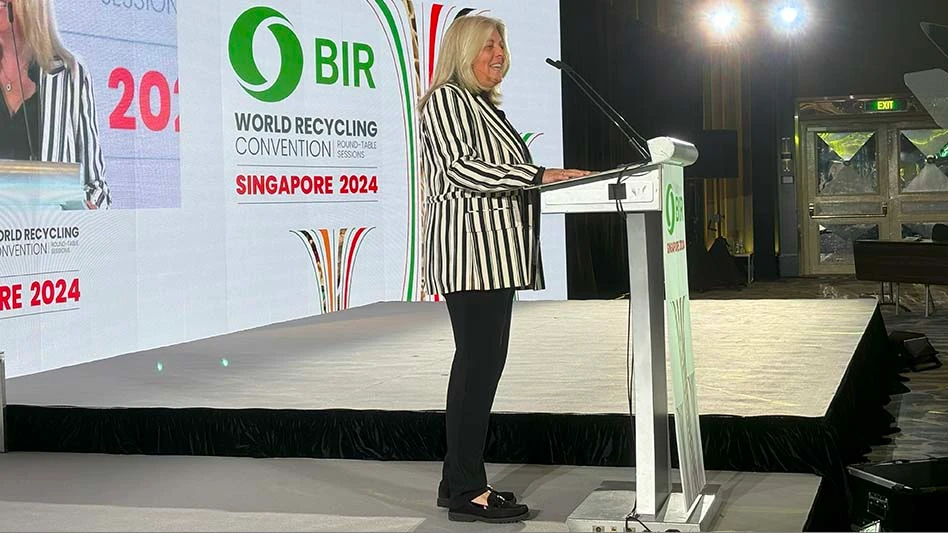
Recycling Today archives
The Brussels-based Bureau of International Recycling (BIR) has issued a four-page position paper titled “Free Trade of Recycled Materials” and is working on a lengthier report, to be issued next year, that will detail low carbon emissions aspects of using end-of-life materials.
The position paper was issued Nov. 1 shortly after more than 1,200 delegates convened for the 2024 BIR World Recycling Convention in late October in Singapore.
At a news conference just before that event, officers and staff members of BIR indicated the position paper would be released soon, along with a “Business Digest” publication designed to provide details and deadlines related to the European Union’s revised Waste Shipments Regulation (WSR).
Although the EU uses the word “waste,” the regulation applies to secondary commodities shipped from EU countries to nations with developing economies that are not members of the Paris-based Organization of Economic Cooperation and Development (OECD).
The WSR was a frequent topic of discussion at nearly all nine BIR sessions in Singapore. According to the association, it is incumbent on a government staff member in any non-OECD country that wishes to keep receiving recycled metal or paper from Europe to meet with EU staff by Feb. 21, 2025, to declare what materials they would like to receive.
Following that, companies and facilities importing EU scrap materials into non-OECD nations will have about two years to go through an auditing process designed to demonstrate health and safety practices deemed to comply with EU standards.
“We are approaching embassies,” BIR Trade and Environmental Director Alev Somer said regarding the role of BIR staff and members, adding that businesses are aware of the approaching deadline.
“Allowing the free movement of recycled materials is key to enabling global investments in recycling infrastructure, innovation and jobs and to ensuring a stable and sustainable global manufacturing supply chain," the BIR writes in its position paper.
Somer said the WSR obligations and disruptions are unhelpful toward the effort to build a global circular economy or to decarbonize—a point of view also taken in the position paper.
On the latter topic, Somer said BIR has been working with global consulting and auditing firm KPMG to conduct a study and prepare a report offering a detailed description of how using recycled metal, paper or other materials reduces emissions compared with other approaches. A breakdown of how recycling conserves natural resources and water also will be included in the report.
Current BIR President Susie Burrage of United Kingdom-based Recycled Products Ltd. and BIR Director General Arnaud Brunet said the association now has more than 1,000 paid members. Brunet said BIR has seen “steady growth for three years.”
India is home to the largest number of BIR members who have joined in in the past 12 months, followed by the United States and the U.K.
BIR staff and officers said they were pleased with the turnout in Singapore, which had reached more than 1,200 delegates the Sunday before the event officially opened the next day. That figure surpassed the autumn 2023 attendance of slightly more than 1,100 in Abu Dhabi, said BIR Convention Committee Chair Brian Henesey of Colorado-based Rocky Mountain Recycling.
The BIR announced Valencia, Spain, as the site of its spring 2025 conference, though that city experienced highly damaging floods shortly after the announcement was made.
The 2024 BIR World Recycling Convention Round-Table Sessions was held at the Raffles City Convention Center/Fairmont Hotel in Singapore Oct. 27-29.
Latest from Recycling Today
- BMW Group, Encory launch 'direct recycling’ of batteries
- Loom Carbon, RTI International partner to scale textile recycling technology
- Goodwill Industries of West Michigan, American Glass Mosaics partner to divert glass from landfill
- CARI forms federal advocacy partnership
- Monthly packaging papers shipments down in November
- STEEL Act aims to enhance trade enforcement to prevent dumping of steel in the US
- San Francisco schools introduce compostable lunch trays
- Aduro graduates from Shell GameChanger program





